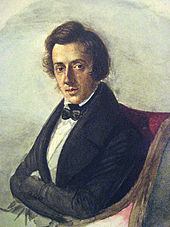This Week in Classical Music: February 24, 2020.Chopin and his interpreters.Next Sunday, March 1st is Frédéric Chopin’s 210th birthday.We’ve been writing about the great composer practically every year but not about some of the famous interpreters of his music.Last week we promised to get back to Benno Moiseiwitsch, who was born in Odessa on February 22nd of 1890.At the age of nine he won the Anton Rubinstein Prize (not to be confused with the Arthur Rubinstein competition, held in Tel Aviv since 1974) and five years later, in 1904, moved to Berlin to study with Theodor Leschetizky.He stayed in Berlin for four years after which his family moved to England.He played his London debut concert in 1909.After WWI Moiseiwitsch engaged in many tours in the US and Europe and for a while taught at the Curtis Institute, where Josef Hofmann was the director.In 1937 he took British citizenship.Rachmaninov used to say that Moiseiwitsch plays his music better than he, Rachmaninov, did.Here’s Benno Moiseiwitsch playing Chopin’s Scherzo No. 3 in C sharp minor Op. 39.This recording was made in 1949.And here he’s playing Chopin’s Nocturne in E Op. 62 No. 2.This one was made later, in 1958, when Moiseiwitsch was 68.Benno Moiseiwitsch died in London on April 9th of 1963.
Myra Hess and Lazar Berman were also born this week.Hess is just three days younger than Moiseiwitsch: she was born on February 25th of 1890.Moiseiwitsch moved to London as a teenager, Hess, also Jewish, was born there.Hess is better known for her interpretations of Bach, Mozart and Beethoven, and of course, for the courageous free concerts she gave in London during WWII while the Germans were bombing the city, but she also played Chopin.Here’s a wonderful, unhurried 1949 live recording of Myra Hess playing Chopin Fantasie in F minor Op. 49.
The Russian-Jewish pianist Lazar Berman would be 90 on February 26th: he was born in Leningrad (now St-Petersburg) on that day in 1930.Berman was a tremendous virtuoso and a great Lisztian but his repertoire was broad and of course Chopin was part of it.Here, from 1973, his recording of Chopin’s Polonaise in A-flat major op.53, "Héroique."
Chopin and his interpreters, 2020
This Week in Classical Music: February 24, 2020. Chopin and his interpreters. Next Sunday, March 1st is Frédéric Chopin’s 210th birthday. We’ve been writing about the great composer practically every year but not about some of the famous interpreters of his music. Last week we promised to get back to Benno Moiseiwitsch, who was born in Odessa on February 22nd of 1890. At the age of nine he won the Anton Rubinstein Prize (not to be confused with the Arthur Rubinstein competition, held in Tel Aviv since 1974) and five years later, in 1904, moved to Berlin to study with Theodor Leschetizky. He stayed in Berlin for four years after which his family moved to England. He played his London debut concert in 1909. After WWI Moiseiwitsch engaged in many tours in the US and Europe and for a while taught at the Curtis Institute, where Josef Hofmann was the director. In 1937 he took British citizenship. Rachmaninov used to say that Moiseiwitsch plays his music better than he, Rachmaninov, did. Here’s Benno Moiseiwitsch playing Chopin’s Scherzo No. 3 in C sharp minor Op. 39. This recording was made in 1949. And here he’s playing Chopin’s Nocturne in E Op. 62 No. 2. This one was made later, in 1958, when Moiseiwitsch was 68. Benno Moiseiwitsch died in London on April 9th of 1963.
week we promised to get back to Benno Moiseiwitsch, who was born in Odessa on February 22nd of 1890. At the age of nine he won the Anton Rubinstein Prize (not to be confused with the Arthur Rubinstein competition, held in Tel Aviv since 1974) and five years later, in 1904, moved to Berlin to study with Theodor Leschetizky. He stayed in Berlin for four years after which his family moved to England. He played his London debut concert in 1909. After WWI Moiseiwitsch engaged in many tours in the US and Europe and for a while taught at the Curtis Institute, where Josef Hofmann was the director. In 1937 he took British citizenship. Rachmaninov used to say that Moiseiwitsch plays his music better than he, Rachmaninov, did. Here’s Benno Moiseiwitsch playing Chopin’s Scherzo No. 3 in C sharp minor Op. 39. This recording was made in 1949. And here he’s playing Chopin’s Nocturne in E Op. 62 No. 2. This one was made later, in 1958, when Moiseiwitsch was 68. Benno Moiseiwitsch died in London on April 9th of 1963.
Myra Hess and Lazar Berman were also born this week. Hess is just three days younger than Moiseiwitsch: she was born on February 25th of 1890. Moiseiwitsch moved to London as a teenager, Hess, also Jewish, was born there. Hess is better known for her interpretations of Bach, Mozart and Beethoven, and of course, for the courageous free concerts she gave in London during WWII while the Germans were bombing the city, but she also played Chopin. Here’s a wonderful, unhurried 1949 live recording of Myra Hess playing Chopin Fantasie in F minor Op. 49.
The Russian-Jewish pianist Lazar Berman would be 90 on February 26th: he was born in Leningrad (now St-Petersburg) on that day in 1930. Berman was a tremendous virtuoso and a great Lisztian but his repertoire was broad and of course Chopin was part of it. Here, from 1973, his recording of Chopin’s Polonaise in A-flat major op.53, "Héroique."